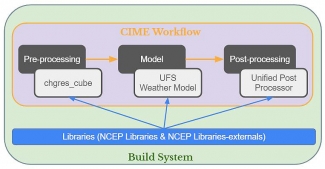The DTC, in cooperation with subject-matter experts from NOAA's Environmental Modeling Center (EMC) and Geophysical Fluid Dynamics Laboratory (GFDL), as well as NCAR’s Climate and Global Dynamics (CGD) Laboratory hosted a live, virtual training session for the Unified Forecast System (UFS) Medium-Range Weather (MRW) Application 4-6 November and 9 November 2020.
The UFS MRW Application targets predictions of global atmospheric behavior out to about two weeks. This training was designed to teach community users how to set up and run the latest officially released UFS MRW Application (version 1.1) for their own experiments. The training comprised a wide range of sessions taught by highly experienced experts and developers in the field. Live lectures were presented by experts on the various UFS components, including the CIME-based workflow, the Finite-Volume Cubed-Sphere (FV3) dynamic core and physics suite options, and pre/post-processing. In addition to lectures, live virtual practice sessions were hosted to broaden experience with building, running, and modifying the system to take full advantage of the supported capabilities for research and forecasting. Throughout the training, participants were able to interact directly with the SMEs to gain a deeper understanding of the system and how to configure it for their purposes. The final day provided an optional "deeper dive" for developers that covered advanced subjects, including code modification, domain configuration, and repository management protocols. The slides from these presentations as well as recordings, are available on the DTC website.
A total of 34 participants registered for the event, representing eight different time zones! Upwards of 54 participants took part in some sessions, with the average being 40-45 attendees including instructors. We had enthusiastic participation in all of the lectures, and the instructors were able to provide prompt and detailed answers to questions raised during the practical sessions using Google Meet and Slack.
Although a virtual meeting was not the preferred method for teaching the material, it nevertheless was a great success, according to the participants. Quotes from the feedback included, "I've really appreciated the practicals and the rapid feedback in the Slack channels." and "I personally enjoyed this training very much and learned a lot. The materials really helped me consolidate some of my knowledge and skill for different components and functionalities in the UFS apps."
